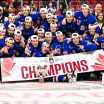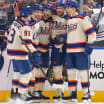Keon hopes Maple Leafs can win opening round for first time since 2004
4-time Stanley Cup champ suggests 'baby steps' to begin path to ultimate title goal
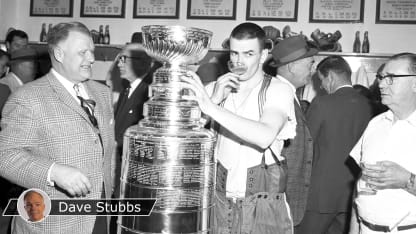
"Baby steps first," the Maple Leafs legend said from his Florida home in the hours before Toronto's 7-3 loss to the Tampa Bay Lightning in Game 1 of the best-of-7 Eastern Conference First Round at Scotiabank Arena on Tuesday.
The Maple Leafs attempt to even the series in Game 2 at Toronto on Thursday (7 p.m. ET; ESPN, CBC, SN, TVAS, BSSUN).
"You have to take the first step, and that's winning the first series. Then after that, you try to take the second step. In Toronto's case, it's been hard to take that first step (having lost their last seven first-round series dating to 2012-13)."
Prior to that, the Maple Leafs failed to qualify for the playoffs for seven straight seasons and have not won an opening-round postseason series since 2004.
Keon accepted congratulations for a 60th anniversary he knew nothing about, even if he vividly recalled the details: on April 18, 1963, the Hall of Fame two-way center scored two short-handed goals, on either side of Eddie Shack's game-winner, to lift the Maple Leafs to a 3-1 Game 5 Stanley Cup victory against the Detroit Red Wings.
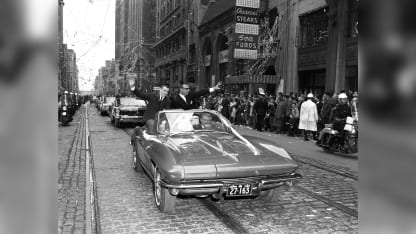
Dave Keon (left) shares a convertible with Eddie Shack for the Toronto Maple Leafs' April 19, 1963 Stanley Cup parade, up Bay St. to City Hall. Graphic Artists/Hockey Hall of Fame
Hockey fever gripped this city then as it did on Tuesday, hardly a unique phenomenon here in late April even if the Maple Leafs were just dipping their toe into 2023 playoff waters to begin what they and their fervent fan base hope will be a long run into May and beyond.
The so-called "Original Six" era Maple Leafs celebrate nine of their 10 championships from 1942-67 between April 14-25, a span of 12 calendar days.
Another wasn't far outside that time frame: The franchise's most recent Stanley Cup was won on May 2, 1967, a six-game upset of the heavily favored Montreal Canadiens.
(Toronto's other three Cup titles fell outside that April 16-25 window, twice before the team had been branded the Maple Leafs -- the 1918 Arenas and 1922 St. Patricks, each in March, then the 1932 Maple Leafs, on April 9.)
Toronto won two championships on April 18, an anniversary asterisk for Game 1 between the Maple Leafs and Lightning.
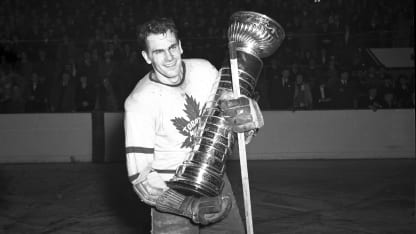
Toronto Maple Leafs' Syl Apps cradles the stovepipe-design Stanley Cup on April 18, 1942, Toronto having completed its spectacular comeback after having been down 3-0 to the Detroit Red Wings in the best-of-seven Final. Imperial Oil-Turofsky/Hockey Hall of Fame
The 1942 title was monumental in that it saw Toronto roar back from a 3-0 games deficit against the Red Wings to win the Cup in seven, the only time that kind of comeback has been engineered in NHL history.
Twenty-one years later to the day, Keon set an NHL record by scoring twice with his team short-handed in a 3-1 championship-clinching Game 5 victory against Detroit. It was Toronto's second of three straight titles, the second such run by the franchise; the first was 1947-49.
RELATED: [Complete Maple Leafs vs. Lighting series coverage]
Keon's short-handed goals record has since been equaled 13 times by 12 players, Wayne Gretzky having matched it twice.
"Dave is the greatest player in the game today," Maple Leafs coach Punch Imlach crowed about Keon in the aftermath of the 1963 victory.
It was the second of four Stanley Cup titles Keon would win; voted in 2016 by fans and a media panel as the greatest Maple Leafs player of all time, he was awarded the 1960-61 Calder Trophy, voted as the NHL's top rookie, 1967 Conn Smythe Trophy, voted as the postseason's most valuable player, and the Lady Byng Memorial Trophy in 1962 and 1963, voted as the League's most gentlemanly player.
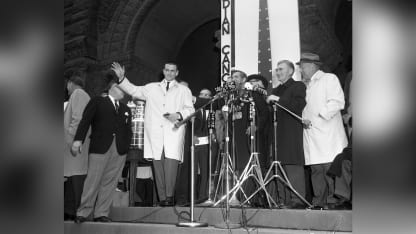
Dave Keon waves from Toronto City Hall steps following the Maple Leafs' April 19, 1963 Stanley Cup parade. Graphic Artists/Hockey Hall of Fame
Wrote Bill MacDougall of the Canadian Press news service 60 years ago: "Along with Keon's scoring achievements, a playoff total of seven goals and five assists, the dark-haired stylist from Noranda, Quebec skated relentlessly throughout the series, spearheading power plays, killing penalties and generally making himself a nuisance to the opposition."
Keon laughed when the sentence was read to him, the suggestion made that he had played an all-purpose game, deployed by Imlach in every situation.
"I guess you could say that," he said, "but I don't even know what 'making himself a nuisance' means."
Perhaps it was that Keon had just broken the Red Wings' hearts twice while killing Toronto penalties. He opened the scoring at 17:44 of the first period, defenseman Allan Stanley off for elbowing, then closed it out at 19:55 of the third into an empty Detroit net, forward Bob Pulford off for holding and the Red Wings playing six skaters against Toronto's four, goalie Terry Sawchuk pulled by Detroit coach Sid Abel in a bid to score the equalizer.
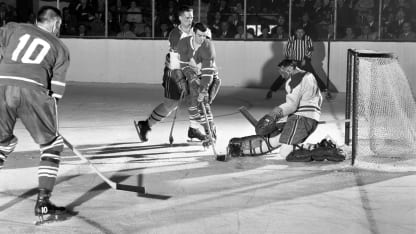
From left, George Armstrong, Terry Harper, Dave Keon, Jacques Plante and referee Vern Buffey during Game 5 action of the 1963 Stanley Cup Semifinal. Toronto would defeat the Montreal Canadiens 5-0 to win the series. Michael Burns Sr./Hockey Hall of Fame
"Alex Delvecchio sort of stumbled. I had to go to the left side and I knew I had him," Keon told reporters that night in re-creating his first goal, having outraced the Red Wings center before beating Sawchuk.
For his second of the night: "I just fired it at the empty net with a few seconds left. If it had missed, I wouldn't have been unhappy."
In the madness of the Maple Leafs room, Stanley, 37, hollered, "Let's make it three in a row next year!" -- which is exactly what Toronto did. Stanley and Keon each would win his fourth and final Cup in 1967, having been teammates for the 1962-64 hat trick.
Knocking off Detroit in five games after having bounced Montreal in a five-game semifinal was a breeze compared to what the Maple Leafs endured the following season.
The 1963-64 team played the maximum 14 games in the playoffs -- seven against the Canadiens, then seven against the Red Wings -- to make it three straight championships, the seventh and final time an NHL team has had to play the maximum number of postseason games.
"In 1963 we were really good," Keon said, reflecting on Toronto's three-straight dynasty. "We won in 10 games and had an opportunity to win it in eight, which really would have been a feather in our cap. In 1964, we were feeling the mental fatigue of a three-peat."
Toronto coach and general manager Punch Imlach with his new late-season trade acquisitions Andy Bathgate (left) and Don McKenney. Getty Images
Added to that was the dramatically different face of the Maple Leafs, the roster upended and the chemistry badly shaken when Imlach, also the GM, made a blockbusting Feb. 22 trade that sent forwards Dick Duff, Bob Nevin and Bill Collins and defensemen Arnie Brown and Rod Seiling to the New York Rangers for forwards Andy Bathgate and Don McKenney.
"That was the year that started the demise of our team," Keon said. "Bathgate and McKenney certainly helped but when I look back on it, I think that Punch could have done a better job handling Bob (Nevin) and Dick (Duff). If we had kept them, we would have won the Stanley Cup and we wouldn't have needed 14 games.
"There were distractions. Some of the players were having problems with Punch -- things that shouldn't have happened but did happen, things that you'd rather had been kept in house but weren't. They made the trade, which was upsetting to everybody. We got the result they wanted but we always felt that if hadn't been made, 'Duffy' and 'Nevvy' would have been fine. That's my opinion all these years later."
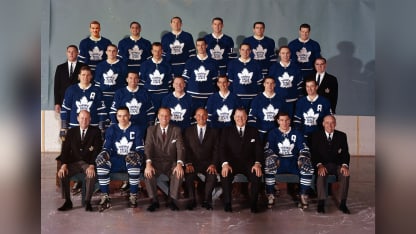
The 1962-63 Toronto Maple Leafs before a February trade shook up the roster. Bottom row, from left: Coach/GM Punch Imlach, George Armstrong, co-owner John Bassett, co-owner Stafford Smythe, co-owner Harold Ballard, Bob Pulford, assistant GM King Clancy. Second row: Allan Stanley, Ron Stewart, Johnny Bower, Don Simmons, Tim Horton, Dick Duff. Third row: Trainer Bob Haggert, Carl Brewer, Eddie Shack, Ed Litzenberger, Frank Mahovlich, Red Kelly, assistant trainer/equipment manager Tommy Naylor. Top row: Dave Keon, Bobby Baun, Bob Nevin, Billy Harris, John MacMillan, Kent Douglas.
The Maple Leafs played a staggering 101 games that 1963-64 season -- 17 preseason exhibitions, 70 in the regular season and 14 in the playoffs. It began with the All-Star Game, a 3-3 tie, Toronto as defending champion against a team selected from the NHL's other five, then through an exhausting postseason, seven of the 14 games decided by a single goal, two in overtime.
"By the time we got to the playoffs," Keon said, "we were physically and emotionally beaten up a bit."
On Tuesday, healed up six decades later, Keon settled in front of his television in Florida to watch his Maple Leafs begin their postseason, hopeful it will be a long one.
"Baby steps," he said. "I think this year they have a good chance of going to the next round."
Top photo: Dave Keon is flanked by Toronto Maple Leafs co-owner Harold Ballard (left) and assistant trainer Tommy Naylor following the team's 1963 Stanley Cup victory. Graphic Artists/Hockey Hall of Fame

